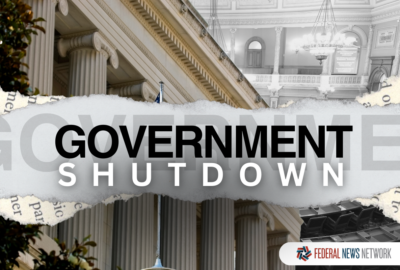Agencies need to do more to train employees on workplace sexual harassment prevention, GAO says
Agencies need to do more to train employees to try to prevent sexual harassment in the workplace, according to a new GAO report.
- There is a partial, short-term deal in the works. But if Congress misses its deadline to fund the government, at least 158,000 federal employees could be furloughed this week. If Congress doesn’t reach an agreement on four appropriations bills by midnight on Friday, some agencies could face a partial government shutdown. Under a lapse in appropriations, furloughed government employees must stop working. And they don't get paid until a shutdown ends. The bills with the Friday deadline include funding for the departments of Agriculture and Energy, and many others. The 158,000 figure for possibly furloughed feds is only an estimation. The real number may be even higher.(Under a possible government shutdown this week, 158,000 feds facing furloughs - Federal News Network)
- The White House is considering new recommendations for agencies to take action on critical infrastructure security. The Cybersecurity and Infrastructure Security Agency should set minimum performance goals across the 16 critical infrastructure sectors, according to a new report from the President’s Council of Advisors on Science and Technology. It found water systems, the electric grid and other systems are increasingly interconnected and increasingly susceptible to both cyber and physical disruptions. The council is also recommending CISA set up a National Critical Infrastructure Observatory to address cyber-physical weaknesses in critical infrastructure systems. (PCAST releases report on strategy for cyber-physical resilience - White House)
- The Food and Drug Administration has outlined the six goals driving its technology modernization. FDA's goal is simple: Unleash its technology and data to improve health for all. How the agency will do that is what Vid Desai, FDA's chief information officer, detailed in the agency's new IT operating plan. Desai laid out six goals, each with strategic initiatives, metrics, project milestones and risks. Additionally, the document included insights around FDA's IT organization, its current governance structure and performance metrics it plans to use. The IT operating plan builds on the IT strategy the agency released in September.
- Federal employees have been filing fewer whistleblower claims in recent years. The Office of Special Counsel saw whistleblower disclosures fall by nearly half between fiscal 2017 and 2022. It also saw a 40% drop in whistleblower retaliation complaints. OSC said the COVID-19 pandemic mostly led to the drop in whistleblower complaints, but Public Employees for Environmental Responsibility (PEER) said there are also other factors at play. PEER said federal employee satisfaction scores have been on the rise, adding that the data corresponds with the Merit Systems Protection Board not having a quorum to rule in appeals of these types of cases. (Federal employee whistleblower complaints fall by nearly half over 5 years - Federal News Network)
- Military construction projects, including five barracks the Army planned to build in the coming year, cannot begin under a continuing resolution. The service had plans to invest in family housing at Fort Leonard Wood and at Fort Eisenhower installations. The projects are stalled until Congress passes the fiscal 2024 budget. The service will not be able to start work on barracks at Joint Base Lewis-McChord, a location known for its high cost of living and shortages of housing for soldiers. (The Army can’t start housing construction projects under continuing resolution - GWU Project for Media)
- The federal fleet continues to march toward the President's goal of being made up only of zero-emission vehicles by 2035. The General Services Administration has already ordered almost 4,000 electric cars and trucks in 2024. That is about 20% of all orders for vehicles and 30% of all orders for light-duty trucks. Those numbers build upon the progress GSA made in 2023, when the agency said it ordered more than 5,800 zero-emission vehicles, which was a 63% increase over 2022. The federal fleet includes about 380,000 vehicles and GSA replaces about 8% of them every year.
- Agencies need to do more to train employees to try to prevent sexual harassment in the workplace, according to a new report from the Government Accountability Office. GAO said the departments of State and Interior, among many other agencies, should identify ways to improve training and awareness of the issue. According to a recent survey, 12% of federal employees said they have experienced sexual harassment within the last two years.(Sexual harassment: Actions needed to improve prevention training for federal civilian employees - Government Accountability Office)
- The Treasury Department’s investment in artificial intelligence is helping it crack down on fraud. The department said it recovered more than $375 million, thanks to AI fraud detection tools its Office of Payment Integrity put in place last year. Those tools help the department flag fraud in near-real time and expedite the process to recover potentially fraudulent payments from financial institutions. The department said check fraud has nearly quadrupled since the COVID-19 pandemic.(Treasury Announces Enhanced Fraud Detection Process Using AI Recovers $375M in Fiscal Year 2023 - Treasury Department)
- Employee engagement is trending up at the Transportation Security Administration, but that doesn’t mean TSA can’t do more to address workforce challenges. A new report from the Government Accountability Office said TSA should analyze the underlying causes of dissatisfaction among transportation security officers. TSA agreed with GAO’s recommendations. TSA also pointed out that its Global Satisfaction Index increased by 15% over the past year, driven largely by historic increases in officers' pay.
- The Chief Digital and Artificial Intelligence Office (CDAO) is seeking a partner to contribute to the development of a "Responsible AI Wire." This analytical product will help the CDAO Responsible AI division to bring together the latest academic research, industry and market developments, and public commentary on responsible AI and AI ethics. The goal of the open call is to find vendors to develop the framework for this analytical product and deliver it regularly. Submissions are due by March 6.
Copyright © 2025 Federal News Network. All rights reserved. This website is not intended for users located within the European Economic Area.
Peter Musurlian
Peter Musurlian is a producer at Federal News Network.
Follow @PMusurlianWFED






